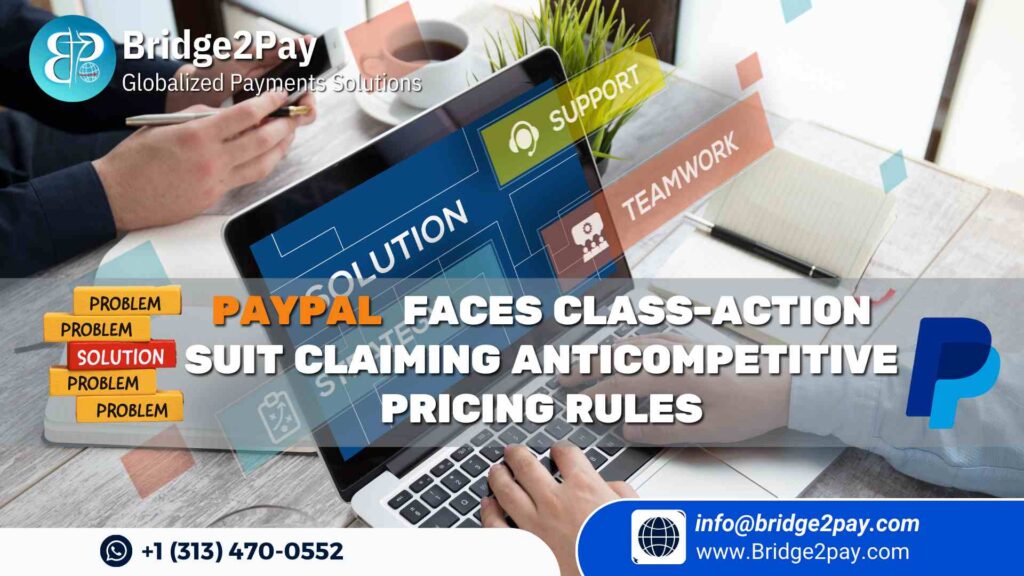PayPal faces class-action suit claiming anticompetitive pricing rules

Bridge2pay explain – Paypal Innovation and competition are nothing new in the realm of digital payments. One of the industry’s pioneers in online payment processing, PayPal, is currently embroiled in a legal dispute. A class-action lawsuit has been brought against the business, accusing it of using pricing policies that are anticompetitive and hurtful to both customers and businesses. The complicated relationship between the world’s largest fintech companies, their customers, and the larger market is highlighted by this lawsuit, which might have far-reaching repercussions. In this in-depth blog article, we will investigate the specifics of the class-action lawsuit against Pay-Pal, look into the claims, consider the ramifications for the fintech sector, and talk about possible outcomes.
Table of Contents
- Introduction: PayPal’s Role in the Fintech Landscape
- Understanding the Class-Action Lawsuit
- The Allegations Against PayPal
- Impact on Consumers and Merchants
- Antitrust Concerns in the Fintech Industry
- PayPal’s Response and Defense
- Similar Cases and Precedents
- The Potential Outcomes
- The Broader Implications for Fintech Giants
- Conclusion: Navigating the Complex World of Fintech Regulation
Introduction: PayPal’s Role in the Fintech Landscape
The fintech sector is dominated globally by PayPal, which was formed in 1998. It has established itself as a household name by offering online payment processing services that simplify corporate and consumer transactions. Millions of people throughout the world prefer Pay-Pal because of its user-friendly platform, strong security features, and global acceptance.
Understanding the Class-Action Lawsuit
In a class-action lawsuit, a number of parties with related concerns file a lawsuit against the defendant, sometimes a business or organization. These lawsuits are often brought when several people have been harmed by a single problem, including claimed anticompetitive actions.
The Allegations Against PayPal
The claims of anticompetitive pricing practices are at the heart of the class action case against Pay-Pal. The lawsuit specifically alleges that Pay-Pal used anticompetitive activities by enforcing regulations that prevent retailers from directing customers to additional and possibly less expensive payment options. Both consumers and businesses have reportedly paid more as a result of this alleged behaviour.
Impact on Consumers and Merchants
The alleged anticompetitive pricing policies of PayPal have a wide range of effects:
- Increased Costs for retailers: If retailers are really prohibited from directing customers toward more affordable payment options, they could have to pay higher transaction costs, which would ultimately reduce their profit margins.
- Consumer Choice: Denying consumers, the freedom to select their preferred payment options may result in less competitive pricing and fewer options for safe and practical payments.
Antitrust Concerns in the Fintech Industry
The innovative and quickly expanding fintech sector has drawn regulatory interest from all across the world. As industry leaders in fintech, like PayPal, take control of significant portions of the market, antitrust issues have emerged. By limiting choice and raising costs, anticompetitive behaviour can hinder innovation and hurt consumers.
PayPal’s Response and Defense
These accusations have not been treated lightly by PayPal. The business has angrily refuted accusations that it has engaged in anticompetitive behaviour and has vowed to tenaciously defend itself in court. According to Pay-Pal, its policies are intended to assure secure and effective payment processing, not to stifle competition.
Similar Cases and Precedents
This legal action against PayPal is not an unusual occurrence. Similar accusations of anticompetitive behaviour have been made against other finance and IT behemoths. Investigations into the business practices of digital corporations have been launched by regulatory organizations in a number of nations, raising concerns about the harmony between innovation and market competition.
The Potential Outcomes
It’s still unclear how this class action lawsuit against PayPal will turn out. Several possibilities are possible:
- Settlement: PayPal may decide to resolve the dispute out of court, which may entail monetary fines and modifications to its operational procedures.
- Legal Battle: If PayPal decides to contest the accusations in court, the case may lead to a drawn-out legal dispute with far-reaching repercussions.
- Regulatory Scrutiny: Regardless of the outcome of the action, it may lead to more regulatory examination of PayPal and other fintech firms, which could result in modifications to current industry norms.
The Broader Implications for Fintech Giants
The lawsuit against PayPal has wider ramifications for industry titans in the fintech sector that operate in a more regulated environment. It emphasizes the significance of upholding antitrust and consumer protection laws while preserving a balance between innovation and competition.

PayPal has been hit with a class-action lawsuit accusing the firm of anticompetitive “anti-steering” rules that leave consumers paying excess charges.
- The suit, filed in California by consumers represented by law firm Hagens Berman, says that PayPal’s anti-steering rules stifle competition against lower cost payment platforms like Stripe and Shopify.
- The rules, written into user agreements that all merchants must sign to accept PayPal and Venmo payments, mean that retailers have to agree not to offer any discounts or inducements to persuade consumers to use other payment options that have a lower cost, say the attorney.
- Merchants also cannot tell customers that other payment methods are more cost-effective or preferred, according to the complaint.
- For example, says Hagens Berman, a merchant could charge $5.83 for a box of Kleenex when PayPal is used as the payment method, and less than $5.83 when the consumer paid with credit card or other payment. Or, a merchant could maintain the same $5.83 sticker price but provide consumers with a discount when they paid with a method other than PayPal or Venmo.
- “Either way, the price differential would result in consumers paying lower all-in prices,” the lawsuit says.
Conclusion: Navigating the Complex World of Fintech Regulation
In conclusion, the class-action lawsuit against PayPal that claims that its pricing policies are anticompetitive sheds insight on the complex dynamics of the fintech sector. Fintech behemoths must navigate a difficult regulatory framework and address accusations of antitrust infractions as they continue to transform the financial landscape. The outcome of this action will be keenly followed because it could set precedents for how fintech businesses conduct business and engage in international competition. The case highlights the necessity for ongoing attention in ensuring honest and competitive practices in the fintech sector and serves as a reminder that even industry leaders are not immune to legal issues.